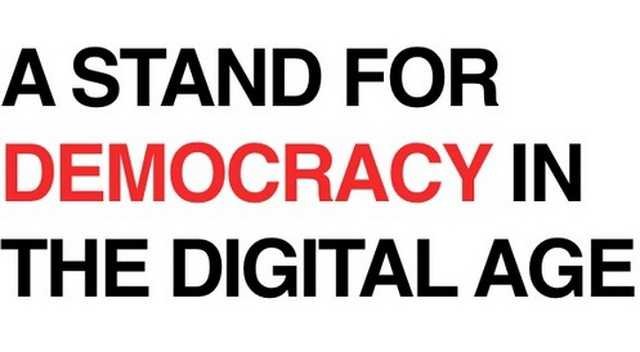
An Appeal from Writers Against Mass Surveillance
World Human Rights Day (International Human Rights Day), 562 writers, including 5 Nobel Prize winners from more than 80 countries, joined forces to appeal for civilian citizens' freedom of action against company and government monitoring. The 5 Nobel Prize-winners are: Orhan Pamuk, JM Coetzee, Elfriede Jelinek, Günter Grass and Tomas Tranströmer.
Also among the signatories are: Umberto Eco, Margaret Atwood, Don DeLillo, Daniel Kehlmann, Nawal El Saadawi, Arundhati Roy, Henning Mankell, Richard Ford, Javier Marias, Björk, David Grossman, Arnon Grünberg, Angeles Mastretta, Juan Goytisolo, Nuruddin Farah, João Ribeiro, Victor Erofeyev, Liao Yiwu and David Malouf.
This global commitment was organized by an independent international group of writers: Juli Zeh, Ilija Trojanow, Eva Menasse, Janne Teller, Priya Basil, Isabel Cole and Josef Haslinger.
On 10 December 2013 is published in 30 newspapers around the world:
In recent months, the extent of mass surveillance has become common knowledge. With some click mouse, the government can access your mobile device, your e-mail, your social networking and your web searches Internet.
They can track and determine your political orientation and activities and, in collaboration with Internet companies, collect and store your data, and therefore can predict your consumption habits and behavior.
The basic pillar of democracy is the inviolable integrity of the individual. Human integrity extends beyond the physical body. In their thoughts and in their personal environment and in their communications, all people have it right to remain unnoticed and undisturbed.
This fundamental human right has become inactive through the abuse of technological developments by states and businesses for the purposes of mass surveillance.
A supervised person is no longer free, a monitored society is no longer a democracy.
In order to maintain any power, our democratic rights must apply to the virtual space as well as to the real space.
- Watching violates the private sphere and jeopardizes freedom of thought and opinion.
- Mass monitoring treats every citizen as a potential suspect. It overturns one of our historical triumphs, the presumption of innocence.
- The monitoring makes the person transparent, while the state and the companies operate secretly. As we have seen, this power is systematically abused.
- Tracking is theft. This data is not public property: it belongs to us. When used to predict our behavior, they steal with them something else: the principle of free will, which is vital for democratic freedom.
WE DEMAND THE RIGHT for all of them people to determine, as democratic citizens, to what extent their personal data may be lawfully collected, stored and processed, and by whom. To receive information about where their data is stored and how it is used. To obtain the possibility to delete their data if it has been illegally collected and stored.
WE WELCOME ALL COUNTRIES AND COMPANIES to respect these rights.
WE WELCOME ALL CITIZENS to stand up and defend these rights.
WE WISH THE UNITED NATIONS to recognize the importance of protecting civil rights in the digital age and to create an International Digital Rights Act.
WE WELCOME THE GOVERNMENTS to sign and enforce such a convention.

Starters:
Juli Zeh Germany
Ilija Trojanow Germany
Eva Menasse Germany
Janne Teller Denmark
Priya Basil UK
Isabel Fargo Cole USA
Josef Haslinger Austria
Signatories:
(cf. in the article)

(Republish with translation from"STAND FOR DEMOCRACY IN THE DIGITAL AGE", Petition by Writers Against Mass Surveillance)





